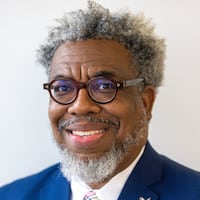There was a moment on Tuesday when Breah Banks just had to stop and soak in the moment.
It was Spelman College’s annual Senior Soiree, held this year at the Georgia Aquarium, where nearly 500 of its graduates would gather together for one of the last times before Sunday’s graduation.
“It was an amazing experience to soak in all of the Black women graduates,” said Banks, Spelman’s Student Government Association President. “To be in a room with so many women who will be getting our degrees is so powerful. This is not common.”
Credit: Spelman College
Credit: Spelman College
The calm and peace at the aquarium almost serves as a metaphor for Spelman heading into the weekend.
In Atlanta and throughout the country, the end of the academic year leading up to commencement exercises has been roiled with controversy and student protests surrounding the ongoing Israel-Hamas war.
Next door at Morehouse College, pockets of students and alumni are still upset that President Biden has been tapped as the commencement speaker.
But at Spelman, the historically Black college for women near downtown Atlanta, the mood is relatively quiet. The graduates are focused on celebrating their own academic accomplishments. They’re also preparing for their own history-making moment. Ketanji Brown Jackson, the first Black woman to serve on the U.S. Supreme Court, will receive an honorary degree. Angela Bassett, the renowned actress and activist, will deliver the commencement address.
Credit: Bloomberg
Credit: Bloomberg
Appointed by President Joe Biden to replace fellow liberal Justice Stephen Breyer, in 2022, Jackson reflected the administration’s commitment to diversifying the court in terms of race, gender and professional background.
She quickly established herself on the high court as one of its most vocal members, writing three solo dissents in her first term.
Last October, when the court ended affirmative action in college and university admissions in cases involving the University of North Carolina at Chapel Hill and Harvard University, Jackson wrote a sharp dissent of the UNC opinion that provided a review of discriminatory practices that brought about some of the country’s key equal protection amendments.
“History speaks,” she wrote. ”In some form, it can be heard forever. The race-based gaps that first developed centuries ago are echoes from the past that still exist today. By all accounts, they are still stark.”
Students at Spelman have been very welcoming to Jackson.
“Having her at Spelman is something we expect as Spelman women,” said Banks, a psychology major from Minneapolis. “We have a specific level of excellence that Spelman sets for its students, so to have a woman who can speak to us as changemakers is very empowering.”
Laila Lacey, Spelman’s senior class president, was also in the room when the college made the decision to honor Jackson. A move, she said, that gave the student body agency over how their commencement exercises should look and feel.
“It was very important that they included the student body in this process early on,” said Lacey, a psychology major from Inglewood, California. “We trust the staff and the administration. We trust their judgment. We wouldn’t want to put ourselves in a situation that other colleges are facing.”
Credit: Spelman College
Credit: Spelman College
Banks, who will be attending graduate school next year at Columbia University, which has been the fulcrum for student protests, said she and her classmates believe in political engagement when done purposefully.
“We use our voices to advocate for justice and equity. So we are equipped, with all the noise, to turn that into meaningful dialogue and action,” Banks said. “We have to encourage and understand the importance of speaking up. But at the same time, engage in the commencement celebration while being mindful of what advocacy looks like.”
Credit: Spelman College
Credit: Spelman College
The class of 2024 is one of the most unique in American history. Many of them did not have in-person high school graduation ceremonies and spent their freshmen years learning at home because of the COVID-19 pandemic.
Now, they are set to graduate from college amid a contentious fight for the White House and a war in the Middle East, both of which are spilling on to college campuses.
“We started our school careers with the pandemic and we missed out on so many things. So to see all of this coming in the same period where we are supposed to be celebrating is disheartening,” Lacey said. “But going to Spelman has been the best decision I have ever made. It gave me the opportunity to connect with like-minded people who look like me. There are no barriers.”
About the Author
Keep Reading
The Latest
Featured




